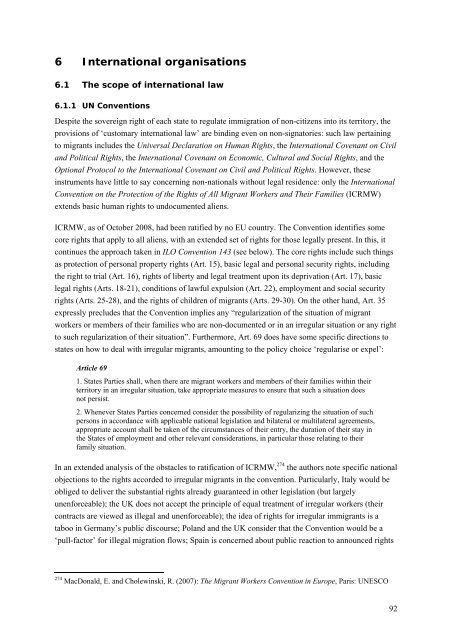REGINE Regularisations in Europe Final Report - European ...
REGINE Regularisations in Europe Final Report - European ...
REGINE Regularisations in Europe Final Report - European ...
Create successful ePaper yourself
Turn your PDF publications into a flip-book with our unique Google optimized e-Paper software.
6 International organisations<br />
6.1 The scope of <strong>in</strong>ternational law<br />
6.1.1 UN Conventions<br />
Despite the sovereign right of each state to regulate immigration of non-citizens <strong>in</strong>to its territory, the<br />
provisions of ‘customary <strong>in</strong>ternational law’ are b<strong>in</strong>d<strong>in</strong>g even on non-signatories: such law perta<strong>in</strong><strong>in</strong>g<br />
to migrants <strong>in</strong>cludes the Universal Declaration on Human Rights, the International Covenant on Civil<br />
and Political Rights, the International Covenant on Economic, Cultural and Social Rights, and the<br />
Optional Protocol to the International Covenant on Civil and Political Rights. However, these<br />
<strong>in</strong>struments have little to say concern<strong>in</strong>g non-nationals without legal residence: only the International<br />
Convention on the Protection of the Rights of All Migrant Workers and Their Families (ICRMW)<br />
extends basic human rights to undocumented aliens.<br />
ICRMW, as of October 2008, had been ratified by no EU country. The Convention identifies some<br />
core rights that apply to all aliens, with an extended set of rights for those legally present. In this, it<br />
cont<strong>in</strong>ues the approach taken <strong>in</strong> ILO Convention 143 (see below). The core rights <strong>in</strong>clude such th<strong>in</strong>gs<br />
as protection of personal property rights (Art. 15), basic legal and personal security rights, <strong>in</strong>clud<strong>in</strong>g<br />
the right to trial (Art. 16), rights of liberty and legal treatment upon its deprivation (Art. 17), basic<br />
legal rights (Arts. 18-21), conditions of lawful expulsion (Art. 22), employment and social security<br />
rights (Arts. 25-28), and the rights of children of migrants (Arts. 29-30). On the other hand, Art. 35<br />
expressly precludes that the Convention implies any “regularization of the situation of migrant<br />
workers or members of their families who are non-documented or <strong>in</strong> an irregular situation or any right<br />
to such regularization of their situation”. Furthermore, Art. 69 does have some specific directions to<br />
states on how to deal with irregular migrants, amount<strong>in</strong>g to the policy choice ‘regularise or expel’:<br />
Article 69<br />
1. States Parties shall, when there are migrant workers and members of their families with<strong>in</strong> their<br />
territory <strong>in</strong> an irregular situation, take appropriate measures to ensure that such a situation does<br />
not persist.<br />
2. Whenever States Parties concerned consider the possibility of regulariz<strong>in</strong>g the situation of such<br />
persons <strong>in</strong> accordance with applicable national legislation and bilateral or multilateral agreements,<br />
appropriate account shall be taken of the circumstances of their entry, the duration of their stay <strong>in</strong><br />
the States of employment and other relevant considerations, <strong>in</strong> particular those relat<strong>in</strong>g to their<br />
family situation.<br />
In an extended analysis of the obstacles to ratification of ICRMW, 274 the authors note specific national<br />
objections to the rights accorded to irregular migrants <strong>in</strong> the convention. Particularly, Italy would be<br />
obliged to deliver the substantial rights already guaranteed <strong>in</strong> other legislation (but largely<br />
unenforceable); the UK does not accept the pr<strong>in</strong>ciple of equal treatment of irregular workers (their<br />
contracts are viewed as illegal and unenforceable); the idea of rights for irregular immigrants is a<br />
taboo <strong>in</strong> Germany’s public discourse; Poland and the UK consider that the Convention would be a<br />
‘pull-factor’ for illegal migration flows; Spa<strong>in</strong> is concerned about public reaction to announced rights<br />
274 MacDonald, E. and Cholew<strong>in</strong>ski, R. (2007): The Migrant Workers Convention <strong>in</strong> <strong>Europe</strong>, Paris: UNESCO<br />
92
















